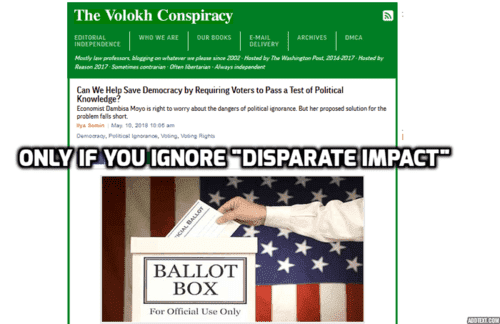
05/13/2018
At the Volokh Conspiracy, law professor Ilya Somin, a Russian immigrant who’s a long-time supporter of illegal immigration, and a Trump-hater, asks Can We Help Save Democracy by Requiring Voters to Pass a Test of Political Knowledge?
In her new book, Edge of Chaos and in a recent op ed in the Guardian, prominent economist and political commentator Dambisa Moyo proposes a solution for the problem of political ignorance, which bedevils democracies around the world. She hopes it can help "save" democracy:
The election of Donald Trump and the Brexit referendum have together tested the limits of people’s faith in democracy … .
Elsewhere too the weaknesses of liberal democracies are becoming increasingly apparent: from falling voter participation rates and the unhealthy power of those funding political parties to the decline of political freedoms. This questioning of democracy is polarising politics and taking debate beyond healthy bounds. Efforts to delegitimise the electoral results are based on the premise that politicians lied and misled, leaving voters to choose on the basis of poor information or wrong information … .
Ultimately, the ideal democracy is one in which as many citizens as possible vote, and the voters are armed with the most objective information … .
In many democracies, including the US and UK, migrants are required to pass government-sanctioned civic tests in order to gain citizenship. So, in this vein, why not give all voters a test of their knowledge? This would ensure minimum standards that should lead to higher-quality decision-making by the electorate. The message this would send is that voting is not just a right, but one that has to be earned. Such testing would not only lead to a better-informed electorate, but also to voters who are more actively engaged.
Of course, such a system would be truly democratic only if everybody had a fair chance of casting their vote. It is vital that those with fewer life opportunities have their say, and we cannot have a system that is skewed against the worst educated, which would leave poorer people even more marginalised and unrepresented than they already are. To that end, the knowledge needed should be part of the core curriculum, with young people tested in their final year of secondary education. Governments could also organise tests for those over school age.
Moyo is absolutely right to worry about the dangers of political ignorance, which is a serious problem in democracies around the world, including both the US and the UK. She is also right to suggest that voter ignorance played a key role in both Brexit and Trump’s victory in the 2016 election. It is good that she has joined the growing list of thinkers who are starting to take the problem of political ignorance seriously. Unfortunately, her proposed solution is not as compelling as her statement of the problem.
The idea of a test of voter knowledge is not a new one. Economist Bryan Caplan, a leading expert on political knowledge, proposed a "Voter Achievement Test" back in 2013 (though he would not deny the franchise to those who scored poorly, but instead reward those who score well with monetary prizes). Libertarian-leaning columnist David Harsanyi advocated a voter test in 2016. In his much-discussed book Against Democracy, Georgetown political philosopher Jason Brennan proposes a system of "epistocracy," which might, among other things, restrict the franchise to those who have adequate knowledge. I myself analyzed similary ideas in my book Democracy and Political Ignorance.
I am not opposed to voter knowledge tests on principle. Indeed, the case for excluding incompetent voters builds on our current practice of excluding children, people with severe mental illnesses, and (as Moyo notes) immigrants who cannot pass a test of civic knowledge that many native-born Americans and Britons would fail. [Failing the Immigration Test bars you from citizenship, rather than voting.] All of these groups are barred from voting in large part because we think they lack the knowledge and reasoning skills to make good decisions at the ballot box.
Nowhere in any of this is there any acknowledgement that blacks would fail these tests at a much higher rate than whites, as they fail all such tests at a much higher rate than whites. It’s what causes the "disparate impact" of all pen-and-paper employment tests. And anything that has a "disparate impact" will be treated as a racist plot, from voter ID, to felon disenfranchisement. See my Democrats Want Not Only Illegal Alien Votes, But Convicted Felon Votes — Including Murderers.
Somin doesn’t seem to have even heard of this issue.
This is a content archive of VDARE.com, which Letitia James forced off of the Internet using lawfare.